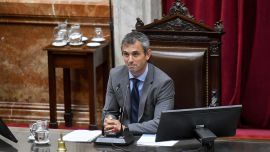Economy Minister Sergio Massa has detailed a raft of economic measures to be applied in the next few weeks to help relieve the harsh effects of inflation and devaluation on behalf of pensioners, the self-employed, recipients of the Alimentar food card and workers in general via soft credits among other announcements.
The most important measures include the one-off payment of a lump sum of 60,000 pesos in two monthly instalments to workers in the public and private sectors, to be absorbed by collective wage bargaining.
This lump sum stands to benefit 5.5 million private-sector workers earning net monthly wages of up to 400,000 pesos with the state absorbing the cost via the payment of the employer contributions to micro-companies (100 percent) and small firms (50 percent). The wage ceiling of a net monthly 400,000 pesos for payment of the 60,000 pesos also applies to public-sector employees.
The package of measures announced by Massa includes a bonus of 37,000 pesos in September, October and November for pensioners and a six-month tax exemption for the monotributista self-employed in the categories A, B, C and D along with access to credits of up to 400,000 pesos in 24, 36 or 48 instalments at a quarter of the current bank interest rate, as well as returning IVA value-added tax on debit card retail purchases.
The self-employed
Massa announced that the monotributista self-employed in the categories A, B, C and D will not pay the tax for the next six months.
The minister further explained that "all monotributistas will have access to a loan of up to four million pesos, depending on the category, to be repaid in 24 instalments at half the bank interest rate with a 100 percent state guarantee."
Massa also highlighted that "the monotributo tax will be put to use productively to incorporate into the formal economy independent workers in the informal economy."
A 37,000-peso booster for minimum pensions
Massa’s second message gave those on the minimum pension advance notice that they would be collecting a booster of 37,000 pesos during the months of September, October and November plus the possibility of being refunded up to 18,000 pesos on their credit card purchases. To the bonus of 20,000 pesos to be collected in August will be added 17,000 pesos, bringing the booster up to 37,000 pesos for the next three months.
"With these increases the minimum pension will reach an annual increase of 147 percent," assured the minister in a video broadcast by the social networks.
Massa further informed that the credit lines of up to 400.000 pesos and payable in 24, 36 or 48 instalments "at a quarter of the current bank interest rates" will remain open for pensioners while "debit card purchases of up to 18,000 pesos may be refunded."
The minister highlighted that the aim "continues to be to look after our pensioners through the Vivir Mejor (Live Better) programme giving them access to free medicine."
Boosters of up to 23,000 pesos for the Alimentar food card
Sergio Massa’s third video announced that the Tarjeta Alimentar food card would be boosted with two additional monthly increases of 10,000 pesos for one-child families, 17,000 pesos for two-child families and 23,000 pesos for three-child families.
"In the task of looking after the most vulnerable sectors, we have taken the further decision of reinforcing the 'Tarjeta Alimentar," said the minister.
Furthermore, once the booster has lapsed, the food card will increase 30 percent "with the idea of safeguarding the access to food of the most vulnerable sectors," indicated Massa.
Soft credits for workers
The Economy minister further announced the possibility of access to credit lines of up to 400,000 pesos in 24, 36 or 48 instalments with the funds to be deposited in a bank credit card within five working days after requesting the loan.
"One of the biggest problems of our workers is their debts to the banks, which is why we have set in motion this programme of 400 billion pesos in credits for workers over 24, 36 and 48 months with a three-month grace period," explained Massa.
"The interest rate is half of what you currently pay on your credit card and can be activated by a simple electronic transaction giving you the possibility of a direct debit from your wage," said Massa, anticipating details to be given by ANSES social security administration chief Fernanda Raverta.
Elimination of export duties for regional economies
The Economy minister announced zero export duties for regional economy items with added industrial value such as wine, grape mash, rice, tobacco, timber and citric peel, among other products, plus a new programme delivering up to five tons of fertilisers for sowing the wheat and maize harvests for farmers within the agricultural emergency.
"Farmers obviously suffered the drought most. That’s why we decided on the state financing of all the fertilisers of those farmers declared in emergency so that they might have the possibility of sowing the next harvest," said Massa.
"Everybody industrialising exports will have zero retentions in order to increase our sales abroad with added value. In the case of those exporting soy meal, oil and pellets, we will give them the disposal of 25 percent of the hard currency for the transitory purchase of the soybean to maintain the employment levels of our soy agro-industrial complex," he explained.
"We will continue with the “Puente al Empleo” programme for the farming sector to transform social plans into registered employment for those who work in the rural sector," he said in a video.
The minister thus anticipated a programme to increase exports making available 25 percent of the hard currency to buy soybean for processing while maintaining jobs in industrial plants and generating added value.
US$770 million for export financing
Massa announced a new US$770-million programme for financing exports: US$550 million from Banco Nación and US$220 million from the Foreign Trade Investment Bank (BICE in its Spanish acronym).
"To keep boosting our exports to strengthen our reserves is another task we have to continue," he said.
The objective, said the minister, "is for companies who sell Argentine labour abroad to have all the tools to keep increasing the volume of exports while accumulating reserves."
A 20,000-peso for recipients of the Potenciar Trabajo job plan
Lastly, a booster of 20,000 pesos was announced for beneficiaries of the Potenciar Trabajo job programme with 10,000 pesos to be paid in September and 10,000 pesos in October.
The measure "reaches 1.3 million beneficiaries with the aim of giving stronger protection and state care to the most vulnerable sectors," he explained.
Fuels and medicine not to go up until November
Massa also announced a five percent price increase guideline of five percent for over 425 companies representing 53,000 products of hygiene and basic foods within the Argentine shopping-basket while freezing the prices of fuels and medicine until November 1.
A benefit of six percent of the total taxation paid by the companies is to be deducted from the IVA value-added tax and the earnings taxation of each of those companies.
Fixed sum of 60,000 pesos for workers in the public and private sectors
Massa announced the payment of a fixed sum of 60,000 pesos in two instalments of 30,000 each in September and October for private-sector workers and national state employees earning up to 400,000 pesos against future collective bargaining agreements.
In the case of micro-companies, the state will return 100 percent of the fixed sum in employer contributions and in the case of PYMES small- and medium-sized companies 50 percent.
Massa said that 5.5 million private-sector workers would benefit, as would public-sector employees earning up to 400,000 pesos. The national minister invited provincial and municipal governments to apply the same measure to bump up incomes.
Benefits for domestic service
Over 420,000 workers in domestic service in private households will benefit from a fixed sum of 25.000 pesos to be paid during the months of September and October proportional to the hours worked.
Massa further said that that state would refund half this payment to employers earning less than two million pesos a month.
"Employers who often have to make an effort to seek help from somebody will be refunded by up to 50 percent by applying to the national Labour Ministry in the cases of households with incomes of up to two million pesos a month," were his words.
Benefits for the PYMES
Massa also announced three measures to favour the PYMES small- and medium-sized companies, of which the first is state financing of half or all (depending on whether they are PYMES or micro-companies) of the 'fixed sum' for workers, deducting it from employer contributions.
A credit line to improve the interest rates for the CREAR programme was set while a single financial filing system was created "to end this story of each bank having its own filing system, the filing system in one bank will be valid in all banks," he said.
"Our PYMES are the motor of our economy, that is why we are setting in motion three concrete measures," said Massa.
Suspension of increases in prepaid healthcare schemes
Families with incomes up to two million pesos will not be subject to increases in prepaid healthcare schemes, according to an emergency decree, said the Economy minister.
“We have decided to suspend all increases in prepaid medicine for the next 90 days for all households whose incomes do not exceed two million pesos so that the sacrifices being made by the workers and the state are accompanied by a healthcare system which does not punish worker budgets," he pointed out



















Comments